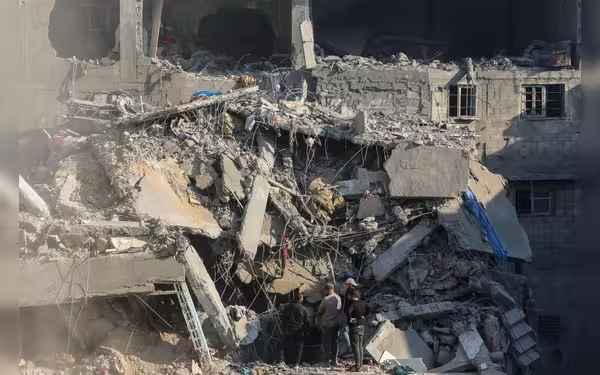Monday, November 25, 2024 09:58 AM
Sudan Humanitarian Crisis: Tens of Thousands Dead Amid Ongoing Conflict
- Over 11 million people displaced in Sudan's conflict.
- Humanitarian aid merely delaying deaths, warns NRC chief.
- Starvation used as a weapon in ongoing violence.
 Image Credits: arabnewspk
Image Credits: arabnewspkThe ongoing conflict in Sudan has led to a severe humanitarian crisis, displacing millions and causing widespread starvation.
In recent months, Sudan has been engulfed in a devastating conflict that has led to a humanitarian crisis of alarming proportions. The ongoing war, which began in April 2023, has seen the regular army clash with the paramilitary Rapid Support Forces (RSF). This violent struggle has resulted in the deaths of tens of thousands and has displaced over 11 million people, leaving nearly 26 million others suffering from acute hunger, according to the United Nations.
Jan Egeland, the chief of the Norwegian Refugee Council (NRC), has voiced his concerns about the dire situation in Sudan, stating that the world seems to be ignoring what he describes as the "biggest humanitarian crisis on the planet." In an interview, he highlighted the grim reality faced by many Sudanese, particularly women who are surviving on just one meal of boiled leaves a day. Egeland emphasized that the humanitarian aid currently being provided is merely "delaying deaths" rather than preventing them.
The NRC has been one of the few organizations able to maintain operations in Sudan, reporting that approximately 1.5 million people are on the brink of famine. Egeland pointed out that the violence is tearing communities apart at a pace that aid organizations cannot keep up with. He lamented the lack of global attention to Sudan's crisis compared to the heightened awareness during the Darfur conflict two decades ago, which was marked by allegations of genocide.
According to Egeland, the ongoing wars in Gaza and Lebanon, as well as the conflict in Ukraine, have overshadowed the plight of the Sudanese people. He noted a shift in the international mood, with Western governments becoming more nationalistic and less focused on humanitarian issues. This inward-looking approach, he warned, could have long-term consequences as those who are neglected may eventually become refugees seeking safety elsewhere.
Inside Sudan, the situation is particularly dire in Darfur, where the capital, El-Fasher, has been under siege for months, crippling aid operations and pushing the nearby Zamzam displacement camp into famine. Even in areas that have not been directly affected by the fighting, the influx of displaced people has overwhelmed local resources, leaving many to fend for themselves.
During a visit to a school in Port Sudan, Egeland witnessed the heartbreaking reality of displaced families, where mothers struggled to feed their children. He questioned how starvation could occur so close to areas that are more accessible for aid delivery. The UN has reported that both sides in the conflict are using hunger as a weapon, complicating efforts to provide necessary assistance.
Egeland described the ongoing starvation as a "man-made tragedy," emphasizing that every delay in aid delivery is a death sentence for families in desperate need. Despite the numerous challenges, he remains hopeful that it is still possible to reach all corners of Sudan. He urged donors to increase funding and called on aid organizations to be more courageous in demanding access to those in need.
The situation in Sudan serves as a stark reminder of the fragility of human life in conflict zones. As the world grapples with multiple crises, it is crucial to remember that behind the statistics are real people facing unimaginable hardships. The international community must not turn a blind eye to the suffering in Sudan, as the consequences of inaction could resonate far beyond its borders.













